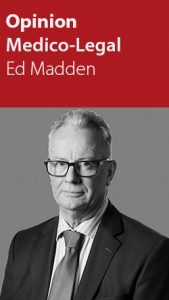Ed Madden , 2025-05-20 07:30:00
Ed Madden, BL, looks at a recent England and Wales High Court case in which the Court had to decide whether it was in a child’s best interests to end life sustaining treatment
In April 2025, the Family Division of the England and Wales High Court delivered its judgment on an application by the Great Ormond Street Hospital for Children NHS Foundation Trust (‘the Trust’) for a declaration that it was no longer in the best interests of a three-year-old boy ‘MG’ to receive life sustaining treatment. It was claimed that the treatment was futile and burdensome; and that its withdrawal would be lawful. The application was opposed by MG’s parents but supported by the child’s Court appointed Guardian.
 When the case came on for hearing, the Court was told that MG was a much-loved child of his parents and of his entire family. In April 2024 he was diagnosed with B cell precursor acute lymphoblastic leukaemia and commenced receiving induction chemotherapy. His parents were told that the treatment had a 90 per cent success rate. Five weeks later the little boy had a sudden neurological collapse. Scans of his brain showed that he had a large clot in one of the main blood vessels supplying blood to the brain.
When the case came on for hearing, the Court was told that MG was a much-loved child of his parents and of his entire family. In April 2024 he was diagnosed with B cell precursor acute lymphoblastic leukaemia and commenced receiving induction chemotherapy. His parents were told that the treatment had a 90 per cent success rate. Five weeks later the little boy had a sudden neurological collapse. Scans of his brain showed that he had a large clot in one of the main blood vessels supplying blood to the brain.
In early June 2024 ‘his pupils stopped reacting’ and an MRI scan revealed a haemorrhage with hydrocephalus. He underwent an operation and an external ventricular drain (‘EVD’) was inserted to relieve the pressure on his brain. MG remained ventilator dependent in an intensive care unit at the Hospital, being fed through a nasogastric tube. In answer to a question from the Court at the beginning of the hearing, counsel for the parents, both of whom are Muslim, made it clear that they wanted treatment to continue because they were ‘hopeful of a miracle’.
The Court received medical evidence from a consultant paediatric neurologist, and from a consultant in paediatric intensive care, both of whom worked for the Trust and treated MG. Evidence was also given by a paediatric intensive care consultant appointed by the parents. Second opinions were provided by two other consultants.
The medical opinion was that MG had suffered a catastrophic brain injury ‘from which he cannot recover’. His brain stem was ‘irrecoverably damaged’. Since that incident, he had not reacted ‘purposefully to his environment’. While he had some reflex movements and some other movements, they were not ‘any sign of consciousness’. The doctors had all reached the same conclusion: that the Court should make the declarations sought in the Trust’s application and that treatment should be discontinued.
Unlike the doctors, the parents in their evidence believed that some of MG’s movements did relate to his environment. The father made clear that should his son’s condition deteriorate further, he would be resigned to his death. neHe would see that as a sign from God. What he would not accept was withdrawing the treatment that MG was receiving at the present time. The mother agreed with the position put forward by her husband.
 In the course of her report, the Guardian said it was with great regret that having carefully considered MG’s unique health needs and individual circumstances, she had come to the conclusion that it was not in his best interest to receive further life sustaining intervention. While intensive care had enabled the child to receive the love, care and attention of his family over a prolonged period of time, he was a patient in his own right; and a view as to what was in his best interest had to be considered separate to what those who loved him might have wanted.
In the course of her report, the Guardian said it was with great regret that having carefully considered MG’s unique health needs and individual circumstances, she had come to the conclusion that it was not in his best interest to receive further life sustaining intervention. While intensive care had enabled the child to receive the love, care and attention of his family over a prolonged period of time, he was a patient in his own right; and a view as to what was in his best interest had to be considered separate to what those who loved him might have wanted.
In coming to her conclusion as to the child’s best interests, the Guardian had considered the matter from a social work perspective rather than a medical one. In doing so, she had factored in the weight to be attached to the family’s Muslim faith and culture.
Giving the judgment of the Court, Mr Justice Trowell said he preferred the doctors’ evidence that MG had no consciousness, to that of the parents. The parents were interpreting movements as being responses when that was not the case. Although he did not like the term, he could not argue with a description of MG as being in a ‘persistent vegetive state’, as contended for by counsel for the Trust. He accepted the very firm medical evidence that there would be no meaningful recovery.
The judge said that it would not come as a surprise to anyone that he was not prepared to make a finding that there would be a miracle. It was the essence of a miracle that it is outside the laws of nature, and he would not make a decision predicated on something occurring in that way.
The judge concluded that it was in MG’s best interests that the treatment should not continue. He said he was aware that this would cause heartbreak for the parents. He described as profoundly impressive their love for their son, their dignity throughout his treatment, and their dignity throughout the Court process.
The Court went on to make the declarations sought. ![]()
Reference: [2025] EWHC 1042 (Fam)



